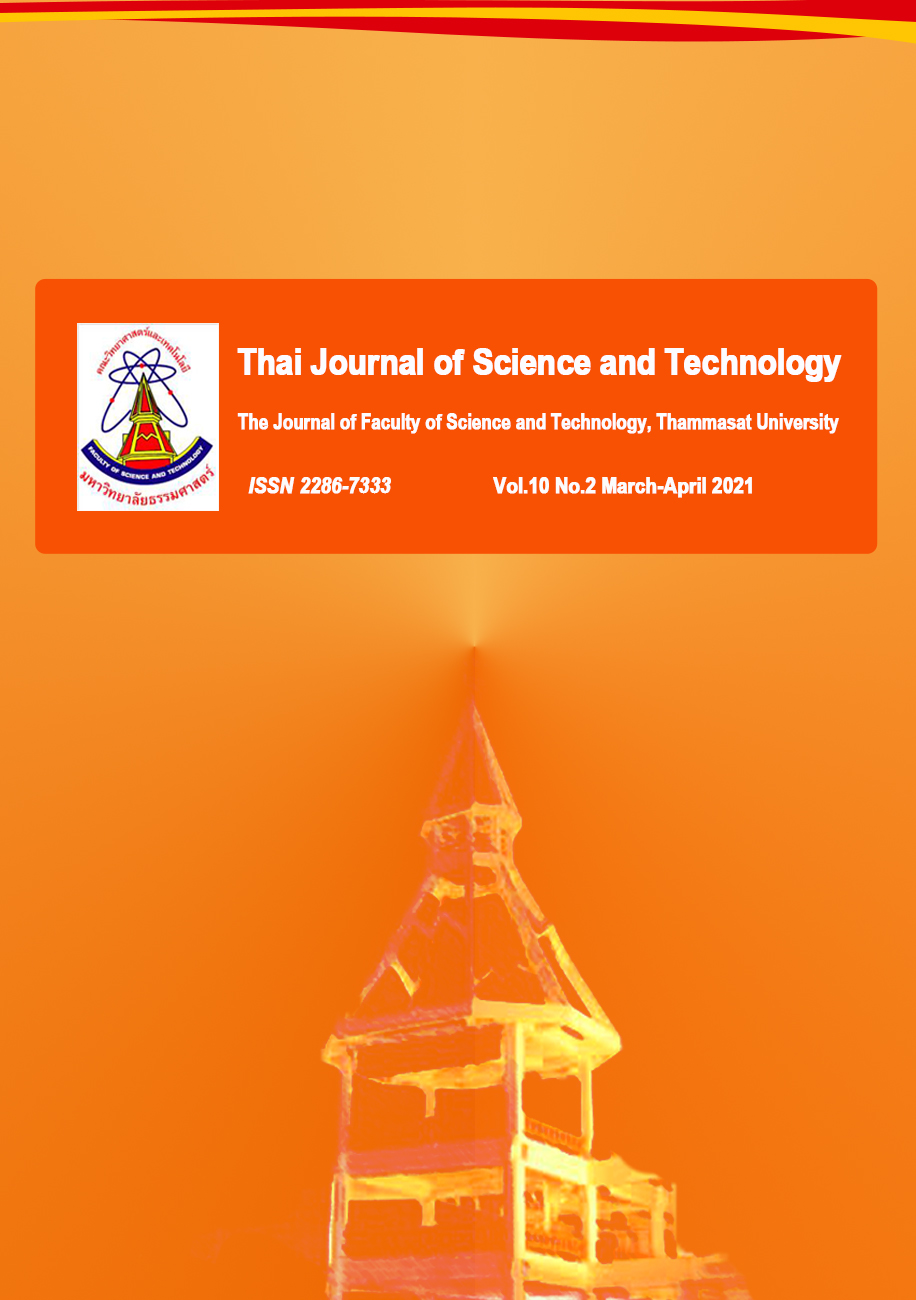Ergonomic Risk Assessments of Timber Harvesting Workers in Teak Plantations, Phrae Province
Main Article Content
Abstract
The study of the ergonomic risk assessments of timber harvesting workers in teak plantations, Phrae province was aimed at assessing the ergonomic risks of the work posture of teak workers to improve safety and health of workers. The study was carried out in four teak plantations. Work postures were assessed by using REBA and RULA techniques, and analyzed using descriptive statistics. The results of the study showed that most of REBA risk assessments had a moderate (action level 2) (81.25%) risk value, meaning investigations and possible work changes were required. The majority of RULA risk assessments were at a high (action level 3) (56.25%) risk value, meaning investigations were required, as well as possible quickly work changes. Tasks that need urgent improvement consisted of the mahout, crane choker setting, tractor choker setting, log number marking, cutting to length, and tree feller. The works could be improved by adjusting the posture to minimize the stooping of the torso as much as possible. Additional tools such as chainsaw hooker, increase the length of the chainsaw bar, or modify the design of the chainsaw could be applied to keep the cutting posture in a straight back position. If there is an adequate budget, the modern machinery may be used in the timber harvesting work.
Article Details

This work is licensed under a Creative Commons Attribution-NonCommercial-NoDerivatives 4.0 International License.
บทความที่ได้รับการตีพิมพ์เป็นลิขสิทธิ์ของคณะวิทยาศาสตร์และเทคโนโลยี มหาวิทยาลัยธรรมศาสตร์ ข้อความที่ปรากฏในแต่ละเรื่องของวารสารเล่มนี้เป็นเพียงความเห็นส่วนตัวของผู้เขียน ไม่มีความเกี่ยวข้องกับคณะวิทยาศาสตร์และเทคโนโลยี หรือคณาจารย์ท่านอื่นในมหาวิทยาลัยธรรมศาสตร์ ผู้เขียนต้องยืนยันว่าความรับผิดชอบต่อทุกข้อความที่นำเสนอไว้ในบทความของตน หากมีข้อผิดพลาดหรือความไม่ถูกต้องใด ๆ
References
Bureau of Occupational and Environmental Diseases. (2019). Report on Situation of Occupational Health and Environment Diseases and Health Hazards 2018. Department of Disease Control. (in Thai)
Chanthalakhana, C., & Uecheawchankit, K. (2005). Research Scripture and International Publication. Bangkok: The Thailand Research Fund. (in Thai)
David, G. C. (2005). Ergonomic Methods for Assessing Exposure to Risk Factors for Work-Related Musculoskeletal Disorders. Occupational Medicine, 55(3), 190–199. https://doi.org/10.1093/occmed/kqi082
Diloksumpun, P., Na Takuathung, C., & Niyom, A. (2016). Ergonomics Risk Assessment of Teak Harvesters by REBA and AI Techniques. Thailand National Ergonomics Conference 2016, 140–148. December15-17, 2016. Bangkok, Thailand. (in Thai)
European Agency for Safety and Health at Work. (2007). Work-Related Musculoskeletal Disorders (MSDs): An Introduction. Retrieved July 16, 2020, from https://osha.europa.eu/en/publications/e-facts/efact09/view
Garland, J. J. (2018). Accident Reporting and Analysis in Forestry: Guidance on Increasing the Safety of Forest Work. Rome: Working Paper No.2. FAO. Retrieved from www.fao.org/publications
Hignett, S., & McAtamney, L. (2000). Rapid Entire Body Assessment (REBA). Applied Ergonomics, 31(2), 201–205.
ILO. (1998). Safety and Health in Forestry Work: An ILO Code of Practice. Geneva: International Labour Office.
Jones, T., & Kumar, S. (2007). Comparison of Ergonomic Risk Assessments in a Repetitive High-Risk Sawmill Occupation: Saw-Filer. International Journal of Industrial Ergonomics, 37(9–10), 744–753. https://doi.org/10.1016/j.ergon.2007.05.005
Kumar, S., & Jones, T. (2009). Comparison of Ergonomic Risk Assessment Methodology with an Example of a Repetitive Sawmill Board Edgar Occupation. In C. M. Schlick (Ed.), Industrial Engineering and Ergonomics: Visions, Concepts, Methods and Tools (pp. 1–710). https://doi.org/10.1007/978-3-642-01293-8
Landekic, M., Katusa, S., Mijoc, D., & Sporcic, M. (2019). Assessment and Comparison of Machine Operators’ Working Posture in Forest Thinning. South-East European Forestry, 10(1), 29–37. https://doi.org/10.15177/seefor.19-02
Manavakun, N. (2004). A Comparison of OWAS and REBA Observational Techniques for Assessing Postural Loads in Tree Felling and Processing. FEC-FORMEC-2004 Conference.
McAtamney, L., & Corlett, N. E. (1993). RULA: A Survey Method for the Investigation of Work-Related Upper Limb Disorders. Applied Ergonomics, 24(2), 91–99. https://doi.org/10.1016/0003-6870(93)90080-S
Micheletti, M. C., Giustetto, A., Caffaro, F., Colantoni, A., Cavallo, E., & Grigolato, S. (2019). Risk Assessment for Musculoskeletal Disorders in Forestry: A Comparison between RULA and REBA in the Manual Feeding of a Wood-Chipper. International Journal of Environmental Research and Public Health, 16(5), 793. https://doi.org/10.3390/ijerph16050793
Paini, A. de C., Lopes, E. da S., Souza, A. P. de, Oliveira, F. M. de, & Rodrigues, C. K. (2019). Repetitive Motion and Postural Analysis of Machine Operators in Mechanized Wood Harvesting Operations. CERNE, 25(2), 214–220. https://doi.org/10.1590/01047760201925022617
Qutubuddin, S. M., Hebbal, S. S., & Kumar, A. C. S. (2013). An Ergonomic Study of Work Related Musculoskeletal Disorder Risks in Indian Saw Mills. Journal of Mechanical and Civil Engineering, 7(5), 7–13.
Royal Forest Department. (2020). Forest Statistics Data 2019 [Thai]. Bangkok.
Sungkaew, S. (2019). Field Dendrology. Bangkok: Kasetsart University. (in Thai)
Unver-Okan, S. (2018). Assessment of Working Postures of Nursery Workers in Seedling Production Activities. In I. Christov, E. Strauss, A.-A. Gad, & I. Curebal (Eds.), Science, Ecology and Engineering Research in the Globalizing World (p. 344). Sofia: St. Kliment Ohridski University Press.
Unver-Okan, S., Acar, H. H., & Kaya, A. (2017). Determination of Work Postures with Different Ergonomic Risk Assessment Methods in Forest Nurseries. Fresenius Environmental Bulletin, 26(12), 7362–7371.
Yaylı, D., & Çalışkan, E. (2019). Comparison of Ergonomic Risk Analysis Methods for Working Postures of Forest Nursery Workers. European Journal of Forest Engineering, 5(1), 18–24. https://doi.org/10.33904/ejfe.556997


